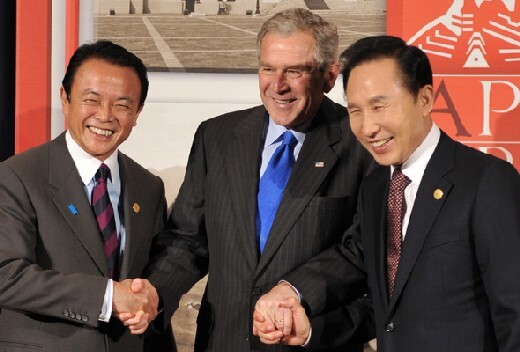hankyoreh
Links to other country sites 다른 나라 사이트 링크
Leaders agree to resume six-party talks

South Korean President Lee Myung-bak, U.S. President George W. Bush and Japanese Prime Minister Taro Aso have agreed to resume the next round of the six-party talks, which have suffered in recent months from disagreement on a verification protocol for North Korea’s nuclear declaration. The decision was made between the leaders of the three countries, in consultation with China and Russia, on the sidelines of the 21-member Asia-Pacific Economic Cooperation summit in Lima, Peru. With less than two months left in his term, U.S. President George W. Bush seems to be pushing for the next round of six-party talks in an apparent effort to list progress on the North Korean nuclear issue as one of his diplomatic achievements, giving the entire matter a particular sense of urgency.
There have been no recent breakthroughs in efforts to resume the six-party talks, despite the announcement from the United States on October 11 that it would remove North Korea from its list of state sponsors of terrorism and the reasons behind the impasse are complex. Outwardly, the key sticking point is the difference between North Korea and the United States over whether international inspectors will be allowed to collect nuclear samples from the North’s Yongbyon reactor as part of the verification protocol agreed to by the two sides on October 1-3. However, most experts say that the six-party talks have effectively been delayed by South Korea and Japan. Both countries argue that the agreement made by North Korea and the United States last month is insufficient and that clearer, stricter verification steps are needed.
Given the circumstances, it is especially noteworthy that leaders of South Korea, the United States and Japan came to an agreement on November 22 (PET) in Lima to hold the next round of six-party talks. Bush was largely seen as the leading force behind the agreement, having persuaded South Korean President Lee Myung-bak and Japanese Prime Minister Taro Aso to agree to the swift resumption of the talks.
Kim Seong-bae, a senior researcher at the Institute for National Security and Strategy, said on November 23, “It seemed that the leaders of South Korea, the United States and Japan agreed to acknowledge the North Korea-U.S. deal on verification as an agreement under the six-party framework.”
For the next round of six-party talks to be held, North Korea must formally agree to the resumption of the talks and China, as the host nation of the six-party talks, must make an official announcement. However, a South Korean government official said, “The North Korean side would have no reason to oppose the six-party talks happening early next month.” So with nothing unexpected, the next round of talks will be held, according to the South Korean government official.
South Korea and Japan have been hoping to install a clearer verification program under the six-party talks that includes the collection of nuclear samples. However, North Korea is more interested in receiving economic and energy aid in return for disablement of its nuclear facilities. The United States and China are likely to bridge the difference.
Though there are differences in what each party wants and how the impact the next U.S. administration’s policy on the six-party talks is perceived, it is possible for all to find common ground.
Another South Korean government official said that there was consensus that the timing of the next round of (six-party) talks would not be set for the time being because of the political situation in the United States, but he added that if the schedule was not set within the month, it was unlikely the talks would occur.
Please direct questions or comments to [englishhani@hani.co.kr]
Editorial・opinion
![[Column] Park Geun-hye déjà vu in Yoon Suk-yeol [Column] Park Geun-hye déjà vu in Yoon Suk-yeol](https://flexible.img.hani.co.kr/flexible/normal/500/300/imgdb/original/2024/0424/651713945113788.jpg) [Column] Park Geun-hye déjà vu in Yoon Suk-yeol
[Column] Park Geun-hye déjà vu in Yoon Suk-yeol![[Editorial] New weight of N. Korea’s nuclear threats makes dialogue all the more urgent [Editorial] New weight of N. Korea’s nuclear threats makes dialogue all the more urgent](https://flexible.img.hani.co.kr/flexible/normal/500/300/imgdb/original/2024/0424/7317139454662664.jpg) [Editorial] New weight of N. Korea’s nuclear threats makes dialogue all the more urgent
[Editorial] New weight of N. Korea’s nuclear threats makes dialogue all the more urgent- [Guest essay] The real reason Korea’s new right wants to dub Rhee a founding father
- [Column] ‘Choson’: Is it time we start referring to N. Korea in its own terms?
- [Editorial] Japan’s rewriting of history with Korea has gone too far
- [Column] The president’s questionable capacity for dialogue
- [Column] Are chaebol firms just pizza pies for families to divvy up as they please?
- [Column] Has Korea, too, crossed the Rubicon on China?
- [Correspondent’s column] In Japan’s alliance with US, echoes of its past alliances with UK
- [Editorial] Does Yoon think the Korean public is wrong?
Most viewed articles
- 1[Guest essay] The real reason Korea’s new right wants to dub Rhee a founding father
- 2Why Korea shouldn’t welcome Japan’s newly beefed up defense cooperation with US
- 3[Column] ‘Choson’: Is it time we start referring to N. Korea in its own terms?
- 4New AI-based translation tools make their way into everyday life in Korea
- 5[Column] Park Geun-hye déjà vu in Yoon Suk-yeol
- 6Senior doctors cut hours, prepare to resign as government refuses to scrap medical reform plan
- 7Opposition calls Yoon’s chief of staff appointment a ‘slap in the face’
- 8Will NewJeans end up collateral damage in internal feud at K-pop juggernaut Hybe?
- 9Terry Anderson, AP reporter who informed world of massacre in Gwangju, dies at 76
- 10Thursday to mark start of resignations by senior doctors amid standoff with government